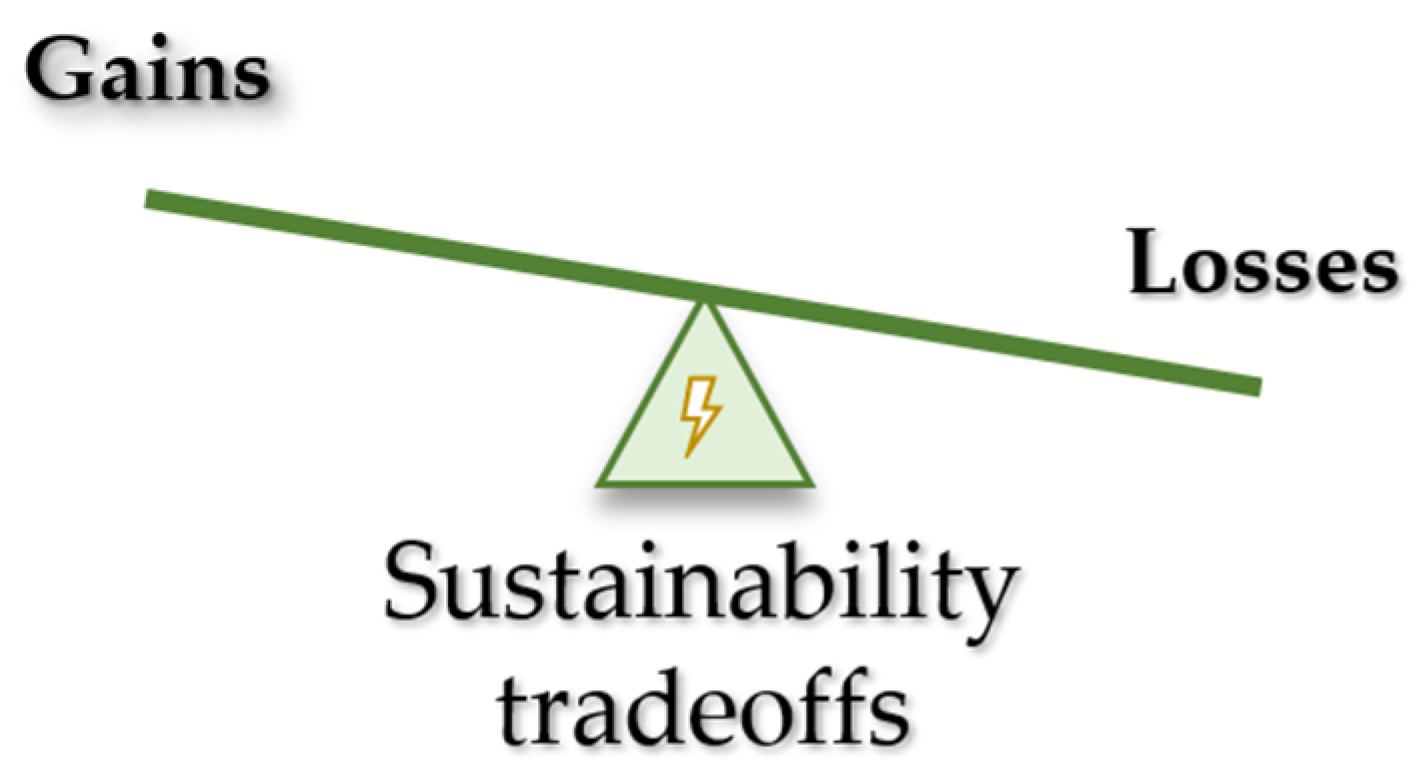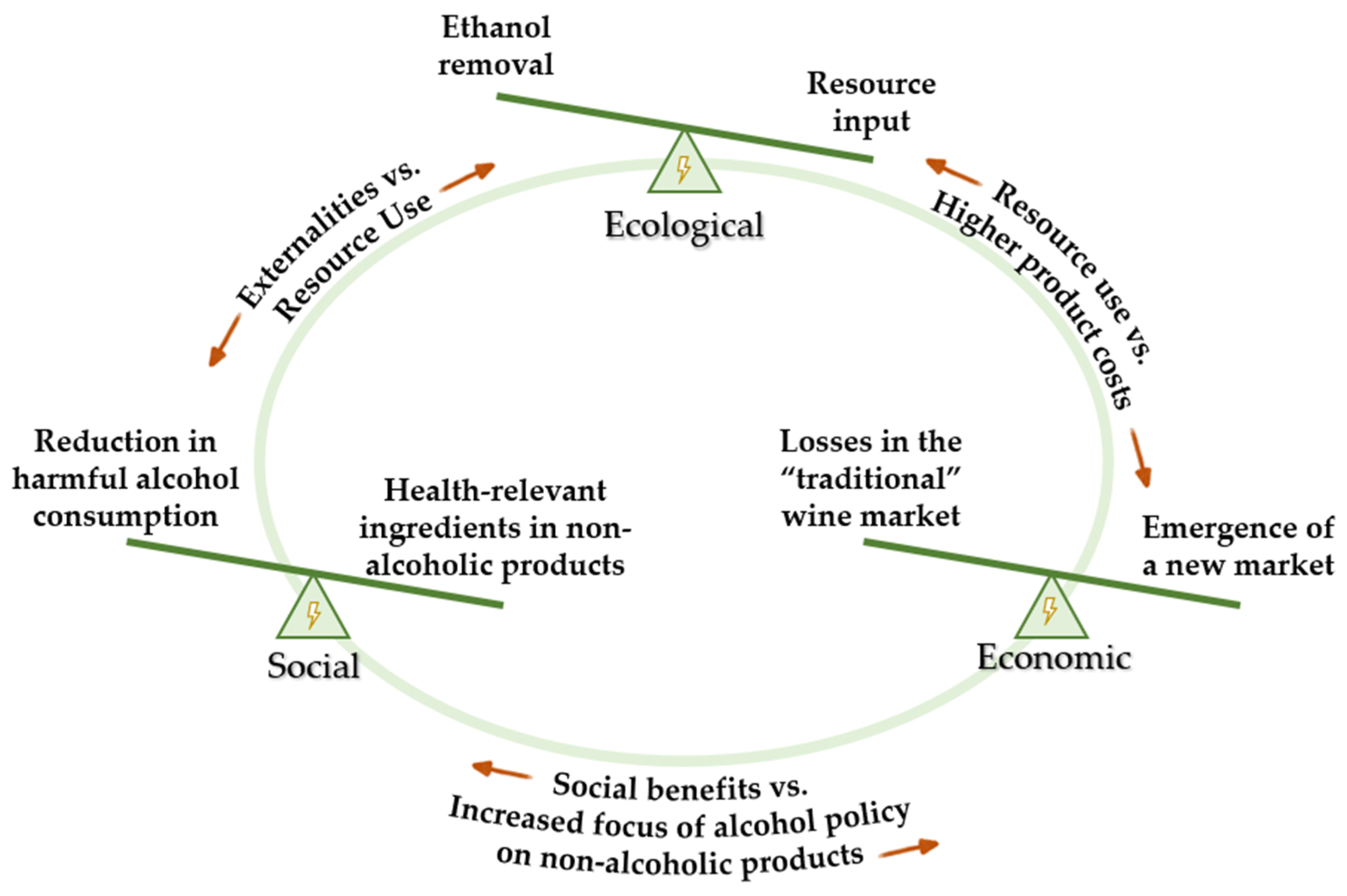Balancing Gains and Losses—A Research Note on Tradeoffs in the Case of Non-Alcoholic Wines in Germany
Abstract
1. Introduction
2. Ecological Sustainability in the Field of Non-Alcoholic Wines
2.1. Processes to Reduce and Remove the Alcohol Content of Wine
- Viticultural, Oenological and Microbiological Approaches;
- Physical Technologies.
2.2. Viticultural, Oenological and Microbiological Approaches
2.3. Physical Technologies
2.4. Substitutes for Non-Alcoholic Wine
2.5. Tradeoffs in Ecological Sustainability within the Field of Non-Alcoholic Wines
3. Economic Sustainability in Non-Alcoholic Wines
3.1. Historical Market Development of Non-Alcoholic Wines
3.2. Current Market Development of Non-Alcoholic Wines
3.3. Tradeoffs in Economic Sustainability within the Field of Non-Alcoholic Wines
4. Social Sustainability in Non-Alcoholic Wines
4.1. Social Aspects of Alcohol Consumption
4.2. Tradeoffs in Social Sustainability within the Field of Non-Alcoholic Wines
5. Discussion
6. Summary and Outlook
Author Contributions
Funding
Conflicts of Interest
References
- OECD. Tackling Harmful Alcohol Use: Economics and Public Health Policy; OECD: Paris, France, 2015; ISBN 978-92-64-18106-9. [Google Scholar]
- WHO. Global Status Report on Alcohol and Health 2018; World Health Organization: Geneva, Switzerland, 2019; ISBN 978-92-4-156563-9. [Google Scholar]
- Schulz, F.N.; Richter, B.; Hanf, J.H. Current Developments in European Alcohol Policy: An Analysis of Possible Impacts on the German Wine Industry. Beverages 2022, 8, 75. [Google Scholar] [CrossRef]
- Bundesverband der Deutschen Spirituosen-Industrie und -Importeure e. V. Daten aus der Alkoholwirtschaft 2023. Available online: https://www.spirituosen-verband.de/fileadmin/introduction/downloads/BSI-Datenbroschuere_2023.pdf (accessed on 2 February 2024).
- Statista Consumer Market Insights. Pro-Kopf-Absatz von alkoholfreiem Bier in Deutschland in den Jahren 2014 bis 2023 mit einer Prognose bis 2027. Available online: https://de.statista.com/statistik/daten/studie/1364658/umfrage/pro-kopf-absatz-von-alkoholfreiem-bier-in-deutschland/ (accessed on 2 February 2024).
- Deutsches Weininstitut. Alkoholfreie Weine und Schaumweine. Available online: https://www.deutscheweine.de/wissen/wein-mehr/entalkoholisierte-weine/ (accessed on 2 February 2024).
- Bertram, J. Langlebiger Trend. Wein + Markt 2021, 2, 32–36. [Google Scholar]
- Zamora, F. Dealcoholised Wines and Low-Alcohol Wines. In Wine Safety, Consumer Preference, and Human Health; Moreno-Arribas, M.V., Bartolomé Suáldea, B., Eds.; Springer International Publishing: Cham, Switzerland, 2016; pp. 163–182. ISBN 978-3-319-24512-6. [Google Scholar]
- Byggeth, S.; Hochschorner, E. Handling trade-offs in Ecodesign tools for sustainable product development and procurement. J. Clean. Prod. 2006, 14, 1420–1430. [Google Scholar] [CrossRef]
- Schmitt, M.; Christmann, M. Alcohol Reduction by Physical Methods. In Advances in Grape and Wine Biotechnology; Morata, A., Loira, I., Eds.; IntechOpen: London, UK, 2019; ISBN 978-1-78984-612-6. [Google Scholar]
- Schmidtke, L.M.; Blackman, J.W.; Agboola, S.O. Production technologies for reduced alcoholic wines. J. Food Sci. 2012, 77, 25–41. [Google Scholar] [CrossRef] [PubMed]
- Schmitt, M.; Christmann, M. Dealcoholization of white wines. In White Wine Technology; Morata, A., Ed.; Elsevier: Amsterdam, The Netherlands, 2022; pp. 369–377. ISBN 9780128234976. [Google Scholar]
- Schmitt, M.; Freund, M.; Schuessler, C.; Rahuhut, D.; Brezina, S. Strategies for the sensorial optimization of alcohol-free wines. In Proceedings of the BIO Web of Conferences, 43rd World Congress of Vine and Wine, Ensenada, Mexico, 31 October–4 November 2022. [Google Scholar]
- Varela, C.; Dry, P.R.; Kutyna, D.R.; Francis, I.L.; Henschke, P.A.; Curtin, C.D.; Chambers, P.J. Strategies for reducing alcohol concentration in wine. Aust. J. Grape Wine Res. 2015, 21, 670–679. [Google Scholar] [CrossRef]
- Contreras, A.; Hidalgo, C.; Henschke, P.A.; Chambers, P.J.; Curtin, C.; Varela, C. Evaluation of non-Saccharomyces yeasts for the reduction of alcohol content in wine. Appl. Environ. Microbiol. 2014, 80, 1670–1678. [Google Scholar] [CrossRef] [PubMed]
- Gonzalez, R.; Quirós, M.; Morales, P. Yeast respiration of sugars by non-Saccharomyces yeast species: A promising and barely explored approach to lowering alcohol content of wines. Trends Food Sci. Technol. 2013, 29, 55–61. [Google Scholar] [CrossRef]
- Morales, P.; Rojas, V.; Quirós, M.; Gonzalez, R. The impact of oxygen on the final alcohol content of wine fermented by a mixed starter culture. Appl. Microbiol. Biotechnol. 2015, 99, 3993–4003. [Google Scholar] [CrossRef]
- Margallo, M.; Aldaco, R.; Barceló, A.; Diban, N.; Ortiz, I.; Irabien, A. Life cycle assessment of technologies for partial dealcoholisation of wines. Sustain. Prod. Consum. 2015, 2, 29–39. [Google Scholar] [CrossRef]
- Schmidt, O. Moderne Kellertechnik: Neue und Bewährte Verfahren; 13 Tabellen; Ulmer: Stuttgart, Germany, 2013; ISBN 978-3-8001-5681-8. [Google Scholar]
- Hamatschek, J. Technologie des Weines; Ulmer: Stuttgart, Germany, 2015; ISBN 978-3-8001-7959-6. [Google Scholar]
- Esteras-Saz, J.; de La Iglesia, Ó.; Peña, C.; Escudero, A.; Téllez, C.; Coronas, J. Theoretical and practical approach to the dealcoholization of water-ethanol mixtures and red wine by osmotic distillation. Sep. Purif. Technol. 2021, 270, 118793. [Google Scholar] [CrossRef]
- Basile, A.; Galiano, F.; Santoro, S.; Figoli, A. Pervaporation and Membrane Contactors. In Membrane Reactor Engineering; Basile, A., de Falco, M., Centi, G., Iaquaniello, G., Eds.; Wiley: Hoboken, NJ, USA, 2016; pp. 280–312. ISBN 9781118906804. [Google Scholar]
- Vilela, A.; Pinto, T. Grape Infusions: The Flavor of Grapes and Health-Promoting Compounds in Your Tea Cup. Beverages 2019, 5, 48. [Google Scholar] [CrossRef]
- Fernandes, B.; Correia, A.C.; Cosme, F.; Nunes, F.M.; Jordão, A.M. Volatile components of vine leaves from two Portuguese grape varieties (Vitis vinifera L.), Touriga Nacional and Tinta Roriz, analysed by solid-phase microextraction. Nat. Prod. Res. 2015, 29, 37–45. [Google Scholar] [CrossRef] [PubMed]
- Deutsches Weininstitut. Deutscher Wein Statistik 2021/2022. Available online: https://www.deutscheweine.de/fileadmin/user_upload/Website/Service/Downloads/Statistik_2021-2022.pdf (accessed on 2 October 2023).
- Del Rey, R.; Loose, S. State of the International Wine Markets in 2022: New market trends for wines require new strategies. Wine Econ. Policy 2023, 12, 3–18. [Google Scholar] [CrossRef]
- Spode, H. Die Macht der Trunkenheit: Kultur- und Sozialgeschichte des Alkohols in Deutschland; Leske und Budrich: Opladen, Germany, 1993; ISBN 3810010340. [Google Scholar]
- Hieronimi, H.H. Alkoholfreier Wein? Erfahrungen in Deutschland. In Proceedings of the 33rd World Congress of Vine and Wine [and] 9th General Assembly of the OIV, Tbilisi, Georgia, 20–25 June 2010; pp. 513–521. [Google Scholar]
- IWSR. IWSR: Growth of No- and Low-Alcohol. Available online: https://www.theiwsr.com/wp-content/uploads/IWSR-2022-No-and-Low-Alcohol-Press-Release.pdf (accessed on 8 August 2023).
- Keller, E.-M. Das neue Alkoholfrei. Weinwirtschaft 2022, 13, 26–30. [Google Scholar]
- Dempfle, M. DWV-INFO NR. 86/2023 RECHT: VERBOT VON ENTALKOHOLISIERTEM BIOWEIN KOMMT. Available online: https://deutscher-weinbauverband.de/dwv-info-nr-86-2023-recht-verbot-von-entalkoholisiertem-biowein-kommt/ (accessed on 31 October 2023).
- WHO. Global Information System on Alcohol and Health. Available online: https://www.who.int/data/gho/data/themes/global-information-system-on-alcohol-and-health (accessed on 3 February 2024).
- Testino, G.; Leone, S.; Borro, P. Alcohol and hepatocellular carcinoma: A review and a point of view. World J. Gastroenterol. 2014, 20, 15943–15954. [Google Scholar] [CrossRef] [PubMed]
- Rehm, J.; Samokhvalov, A.V.; Shield, K.D. Global burden of alcoholic liver diseases. J. Hepatol. 2013, 59, 160–168. [Google Scholar] [CrossRef] [PubMed]
- Rehm, J.; Shield, K.D.; Weiderpass, E. Alcohol consumption. A leading risk factor for cancer. Chem. Biol. Interact. 2020, 331, 109280. [Google Scholar] [CrossRef]
- Sontate, K.V.; Rahim Kamaluddin, M.; Naina Mohamed, I.; Mohamed, R.M.P.; Shaikh, M.F.; Kamal, H.; Kumar, J. Alcohol, Aggression, and Violence: From Public Health to Neuroscience. Front. Psychol. 2021, 12, 699726. [Google Scholar] [CrossRef]
- Papalimperi, A.; Athanaselis, S.; Mina, A.; Papoutsis, I.; Spiliopoulou, C.; Papadodima, S. Incidence of fatalities of road traffic accidents associated with alcohol consumption and the use of psychoactive drugs: A 7-year survey (2011–2017). Exp. Ther. Med. 2019, 18, 2299–2306. [Google Scholar] [CrossRef]
- Stuckler, D.; Mckee, M.; Ebrahim, S.; Basu, S. Manufacturing epidemics: The role of global producers in increased consumption of unhealthy commodities including processed foods, alcohol, and tobacco. PLoS Med. 2012, 9, e1001235. [Google Scholar] [CrossRef]
- WHO. Thirty-Sixth World Health Assembly: Resolutons and Decisions Annexes; World Health Organization: Geneva, Switzerland, 1983; Available online: https://apps.who.int/iris/handle/10665/159886?show=full (accessed on 2 February 2024).
- WHO. Global Strategy to Reduce the Harmful Use of Alcohol; World Health Organization: Geneva, Switzerland, 2010; ISBN 978-92-4-159993 1. [Google Scholar]
- WHO. Seventy-fifth World Health Assembly—Daily Update: 27 May 2022. Available online: https://www.who.int/news/item/27-05-2022-seventy-fifth-world-health-assembly---daily-update--27-may-2022 (accessed on 4 February 2024).
- WHO. Tackling NCD’s: ‘Best buys’ and Other Recommended Interventions for the Prevention and Control of Noncommunicable Diseases. Available online: https://apps.who.int/iris/bitstream/handle/10665/259232/WHO-NMH-NVI-17.9-eng.pdf (accessed on 5 February 2024).
- European Parliament. Outcome, Work and Activities of the Special Committee on Beating Cancer: September 2020–December 2021—An Overview. Available online: https://www.europarl.europa.eu/cmsdata/246543/BECA_Compendium_final_lr.pdf (accessed on 3 February 2024).
- European Parliament. REPORT on Strengthening Europe in the Fight against Cancer—Towards a Comprehensive and Coordinated Strategy: Amendments 033-037. Available online: https://www.europarl.europa.eu/doceo/document/A-9-2022-0001-AM-033-037_EN.pdf (accessed on 4 February 2024).
- European Parliament. Strengthening Europe in the Fight against Cancer: European Parliament Resolution of 16 February 2022 on Strengthening Europe in the Fight against Cancer—Towards a Comprehensive and Coordinated Strategy (2020/2267(INI)). Available online: https://www.europarl.europa.eu/doceo/document/TA-9-2022-0038_EN.pdf (accessed on 27 January 2024).
- Smith, C. ‘Absurd’ Health Warning Wine Labels in Ireland Angers Europe. Available online: https://www.thedrinksbusiness.com/2023/02/absurd-health-warning-wine-labels-in-ireland-angers-europe/ (accessed on 12 April 2023).
- Mercer, C. Tension Rises over Ireland’s Health Warning Labels for Wine. Available online: https://www.decanter.com/wine-news/tension-rises-over-irelands-health-warning-labels-for-wine-498570/ (accessed on 12 April 2023).
- Schaller, K.; Kahnert, S. Alkoholatlas Deutschland 2017; 1. Auflage; Pabst Science Publishers: Lengerich, Westf, 2017; ISBN 978-3-95853-334-9. [Google Scholar]
- Malik, V.S.; Popkin, B.M.; Bray, G.A.; Després, J.-P.; Willett, W.C.; Hu, F.B. Sugar-sweetened beverages and risk of metabolic syndrome and type 2 diabetes: A meta-analysis. Diabetes Care 2010, 33, 2477–2483. [Google Scholar] [CrossRef]
- Schulz, F.N.; Farid, H.; Hanf, J.H. The Lower the Better? Discussion on Non-Alcoholic Wine and Its Marketing. Dietetics 2023, 2, 278–288. [Google Scholar] [CrossRef]
- Aldaco, R.; Diban, N.; Margallo, M.; Barceló, A.; Ortiz, I.; Irabien, A. Environmental Sustainability Assessment of an Innovative Process for partial Dealcoholization of Wines. In Proceedings of the 9th International Conference on Life Cycle Assessment in the Agri-Food Sector, San Francisco, CA, USA, 8–10 October 2014. [Google Scholar]
- OIV. Congress ‘Lifestyle, Diet, Wine & Health’. Available online: https://www.oiv.int/press/congress-lifestyle-diet-wine-health (accessed on 2 February 2024).
- Schulz, F.N.; Hanf, J. (Selbst-)Regulierung: Die deutsche Weinbranche im Zeichen neuer alkoholpolitischer Bestrebungen. In Deutsches Weinbaujahrbuch 2024; Stoll, M., Schultz, H.-R., Eds.; Ulmer: Stuttgart, Germany, 2023; pp. 110–117. ISBN 978-3-8186-2037-0. [Google Scholar]
- Haunschild, R.; Marx, W. On Health Effects of Resveratrol in Wine. Int. J. Environ. Res. Public Health 2022, 19, 3110. [Google Scholar] [CrossRef]


| Sustainability-Relevant Tradeoffs | |||
|---|---|---|---|
| To Gain | To Give Up | ||
| Sustainability-relevant practices | Steady increase in the production of non-alcoholic wines |
|
|
| Usage of thermal and membrane dealcoholization processes |
|
| |
| Removal of ethanol |
|
| |
Disclaimer/Publisher’s Note: The statements, opinions and data contained in all publications are solely those of the individual author(s) and contributor(s) and not of MDPI and/or the editor(s). MDPI and/or the editor(s) disclaim responsibility for any injury to people or property resulting from any ideas, methods, instructions or products referred to in the content. |
© 2024 by the authors. Licensee MDPI, Basel, Switzerland. This article is an open access article distributed under the terms and conditions of the Creative Commons Attribution (CC BY) license (https://creativecommons.org/licenses/by/4.0/).
Share and Cite
Schulz, F.N.; Kugel, A.A.; Hanf, J.H. Balancing Gains and Losses—A Research Note on Tradeoffs in the Case of Non-Alcoholic Wines in Germany. Sustainability 2024, 16, 2451. https://doi.org/10.3390/su16062451
Schulz FN, Kugel AA, Hanf JH. Balancing Gains and Losses—A Research Note on Tradeoffs in the Case of Non-Alcoholic Wines in Germany. Sustainability. 2024; 16(6):2451. https://doi.org/10.3390/su16062451
Chicago/Turabian StyleSchulz, Frederik Nikolai, Alexander A. Kugel, and Jon H. Hanf. 2024. "Balancing Gains and Losses—A Research Note on Tradeoffs in the Case of Non-Alcoholic Wines in Germany" Sustainability 16, no. 6: 2451. https://doi.org/10.3390/su16062451
APA StyleSchulz, F. N., Kugel, A. A., & Hanf, J. H. (2024). Balancing Gains and Losses—A Research Note on Tradeoffs in the Case of Non-Alcoholic Wines in Germany. Sustainability, 16(6), 2451. https://doi.org/10.3390/su16062451






